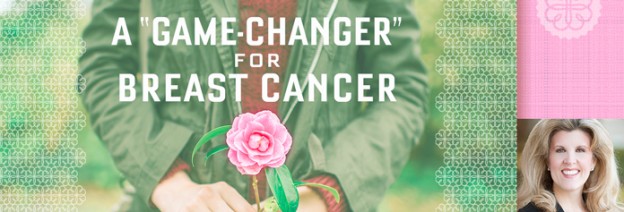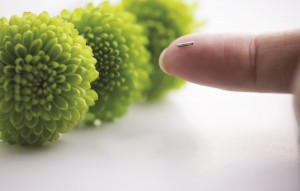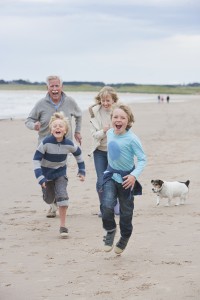
A “Game-Changer” for Breast Cancer
Last October, we spoke with the CEO of Concure Oncology, Sandra Rorem, to learn about a ground-breaking new breast cancer treatment. A year later, we check in with Sharon Purcell to see how the treatment is spreading out across the country and what women have to say about it.
——
4word: We spoke with your CEO, Sandra Rorem, a year ago just as Breast Microseed, Inc. was launching. What has happened in the past year?
Sharon: When 4word spoke to our CEO last October, we were very excited to be bringing this breakthrough breast cancer treatment to women in the U.S. In the year since, we have made great strides toward making Breast Microseed Treatment™ available to women from coast to coast, and work hard every day to expand our reach. We began by partnering with the Swedish Cancer Institute in Seattle as the first cancer center in the country to provide our post-lumpectomy radiation treatment to women with early-stage breast cancer, and treated our first U.S. patient there in May of this year. Over the next few weeks, our first East Coast site (Pittsburgh, PA) will start seeing patients, with hospitals in Georgia, Virginia, and California expected to offer Breast Microseed Treatment in the next several months.
Our efforts over the past year have been entirely focused on our goal of making this treatment accessible to women across the nation, no matter where they live – by getting it into regional cancer treatment centers that women can conveniently travel to. For women who don’t have a treatment site within driving distance, they can still fly to one of our regional sites for treatment and head back home the next day. The beauty of our treatment is that it’s administered in a single, one-hour outpatient procedure so women are able to leave the hospital the same day, and don’t have to return for additional radiation treatments. Breast Microseed Treatment is One Time, One Hour.
4word: Are women receptive or skeptical of this treatment?
Sharon: Women are incredibly receptive to this treatment. Through presentations to civic and women’s organizations, our Women’s Advisory Group, social media, and everyday conversations, we hear this regularly. Women love learning that there is a new treatment option for early-stage breast cancer that won’t debilitate or inconvenience them for weeks at a time, like other post-lumpectomy options. Just last night after describing our treatment at a dinner party, one woman enthusiastically said, “It’s about time!,” while another reached out to hold my hand, looked me tenderly in the eye and said a heartfelt “Thank you.” After a few moments she added, “I so wish this treatment had been available when my mother was diagnosed.” Both women went on to share their personal stories of loved ones they’d lost to this disease and expressed gratitude for this kinder, gentler, more convenient way to treat early-stage breast cancer.
What these women were reacting to is how our new treatment contrasts dramatically to their knowledge of existing early-stage breast cancer treatments, in terms of side effects and inconvenience. What we’re learning is that women are almost more afraid of the treatment for their cancer, than of the diagnosis itself. Current post-lumpectomy radiation treatments can require up to 30 radiation sessions, delivered five days a week, at a hospital or clinic. That’s six weeks of going to the hospital for treatment every single day, Monday through Friday. Another option, which has fewer treatments at 10 sessions, still requires women to make two trips to the hospital per day. In this form of treatment, a catheter is left in the breast for a week, which means that women are not allowed to shower during the course of their 10 treatments. I don’t know about you, but that’s not something I’d look forward to. And the side effects for those options include debilitating fatigue, potential risk of radiation exposure to vital organs, skin burns that leave scars, and painful breast infections.
With Breast Microseed Treatment, side effects are milder and much less frequent, and patients only go to the hospital one time for the procedure. Dr. Steve Eulau, the Radiation Oncologist at Swedish Cancer Institute who treated our first patient, calls this “a game changer.” He said, “This is a historic moment for us……to be able to take women who would otherwise be consigned to weeks and weeks of treatment, with brisk skin reactions and a lot of fatigue, and to now be able to accomplish their treatment in a one-hour procedure is breathtaking. And chances of the cancer coming back are really, really small.”
If there is ever any skepticism from women about this treatment, it is short-lived after they get answers to their most common questions about side effects, convenience and efficacy. Women are comforted to know that Breast Microseed Treatment has more than 10 years of clinical trials demonstrating its safety and efficacy – it has a five year overall survival rate of 97.4%, and a 98% patient satisfaction rate. I especially love that about this treatment, and find those statistics comforting myself.
4word: How does this treatment impact the lives of your patients and women who will receive it in the future?
Sharon: Two months after her treatment, one of our patients in Seattle spoke to me about her experience with Breast Microseed Treatment. She works full time and has a family and was initially concerned that treatment would have a negative impact on both. She said she was so relieved when she found out there was a new treatment for her type of breast cancer that wouldn’t take her away from her job or personal commitments to her family. When she learned more about our treatment, her decision to have it was “a no-brainer.”
 There are many different types of breast cancer, along with many different ways to treat those types and stages. Complicated treatments and surgeries are necessary for more aggressive and advanced-stage breast cancers. But for early-stage breast cancer, complicated, lengthy treatments that require long recovery periods are completely unnecessary. Breast Microseed Treatment is a welcome innovation in the long evolution of early-stage breast cancer treatment. We’ve come such a long way in this evolution……from mastectomy, to lumpectomy with weeks of daily radiation, to now, lumpectomy followed by a simple one-hour procedure that allows women to quickly get back to living their lives.
There are many different types of breast cancer, along with many different ways to treat those types and stages. Complicated treatments and surgeries are necessary for more aggressive and advanced-stage breast cancers. But for early-stage breast cancer, complicated, lengthy treatments that require long recovery periods are completely unnecessary. Breast Microseed Treatment is a welcome innovation in the long evolution of early-stage breast cancer treatment. We’ve come such a long way in this evolution……from mastectomy, to lumpectomy with weeks of daily radiation, to now, lumpectomy followed by a simple one-hour procedure that allows women to quickly get back to living their lives.
For another example of how our treatment impacts the lives of our, and future, patients – coincidentally, last night after leaving my dinner party I received a notification on my phone from our Facebook company page. A woman found us on social media and posted that Breast Microseed Treatment is “an amazing treatment that was long overdue for today’s modern women.” She may not have undergone this treatment, but she sees how important it is to continue improving upon the work that has already been done in the field of breast cancer treatment…..to not assume that what’s currently out there is the best there is. We have now found a way to treat early-stage breast cancer so that women are impacted the least. They can be treated with Breast Microseed Treatment in a single outpatient visit, and get back to their normal lives – back to work, to their families, and all the things they love – the very next day!
4word: Why is this treatment so needed for women?
Sharon: As our CEO, Sandra Rorem, told 4word last year: Breast Microseed Treatment is “truly a critical option to have available to women in the U.S., especially professional women who have jobs they need to return to.” This treatment is very convenient for active women like the women of 4word, be they full-time career women, mothers, grandmothers, or family caregivers. As we know, today’s modern woman often fulfills all of these roles simultaneously. When today’s woman, with all her responsibilities, is diagnosed with breast cancer, she has many fears. She wonders “Will it make me sick? Will I be in a lot of pain? Will I be cured? How much time will I have to take off of work, or be away from the people and things I love?” It’s important that she be able to quickly put cancer behind her. While she’ll never forget that she had it, she shouldn’t have to live with memories of how difficult and debilitating her treatment was, or feel guilty about the time she lost being healed. At Concure Oncology/Breast Microseed, Inc., we are emotionally and passionately invested in not only saving lives…but also in preserving the quality of those lives. We love that Breast Microseed Treatment allows women to quickly return to their normal lives and get “focused on life after cancer.”
4word: Is there anything else you’d like to share with our readers?
Sharon: Every day I am compelled to remind women that breast cancer is so treatable when it’s caught early! Early detection is still your best protection. Despite the confusing mixed messages in the media, the combination of monthly self-exams, regular clinical exams, and mammograms is still key to finding cancer at its earliest stages when tumors are the smallest.
Coincidently, but unbeknownst to each other, this year both my CEO Sandra and I had our annual mammograms on the same day. It wasn’t until we returned to work the next day and were talking that we discovered we had a similar experience at our exams. I told her that my mammogram this year, which as we all know is far from a pleasant experience, was the first “piece of cake mammo” I’d ever had. Not only did the time pass quickly and I barely noticed the discomfort of the squeezing (because I spoke to the technician non-stop about this “new treatment option”), but I also had complete confidence and peace of mind that I would be fine if they found anything. Breast cancer is nearly 100% curable with early detection, and I faithfully maintain a routine screening schedule. So if they caught anything, it would be early stage, and I was relieved to know that I have Breast Microseed Treatment as an option. It would definitely be my choice for treatment, and cancer would only be a minor blip on my life’s radar. Sandra smiled and said “my thoughts exactly.”
——
4word women, are you vigilant in your early detection practices? We hope that Sharon’s interview has helped you see that early detection is the key to fighting breast cancer, and that if you develop breast cancer, this treatment could be your key to getting back to normal life as soon as possible!
——
Please click here to receive these impactful blogs automatically to your inbox.
——
Sharon has had a 25-year career in sales, marketing, business development and operations, working for both Fortune 100 companies like GE, as well as for start-ups. She has held leadership roles across multiple industries, and has a strong track record of driving business transformation and growth in highly competitive markets. Sharon has dedicated the past five years to consulting with healthcare start-ups, leading brand management, sales, marketing, and communications.
Sharon has built business models and initiatives from the ground up, and has breathed new life into failing or stalled initiatives that led to explosive growth. In her 15 years with GE, she was responsible for contributing in excess of $1 billion to the bottom line. In addition to her primary responsibilities, she was a founding member of the GE Women’s Network, a business organization that fosters professional women’s development to attract, advance and retain successful women throughout the company. As a leader in the Network for 10 years she helped fuel its growth, expanding the organization to 50,000 members globally where female leaders generated $50 billion in revenue. She is enormously proud to have been part of such ground-breaking women’s empowerment.
Sharon believes that work was a vital stepping stone in the path of using her voice to change women’s lives. Her expertise lies not only in her ability to translate company vision into compelling, values-based messaging, but also as an inspiring storyteller. Sharon received her B.A. in English/Writing from St. Edward’s University in Austin, Texas.

